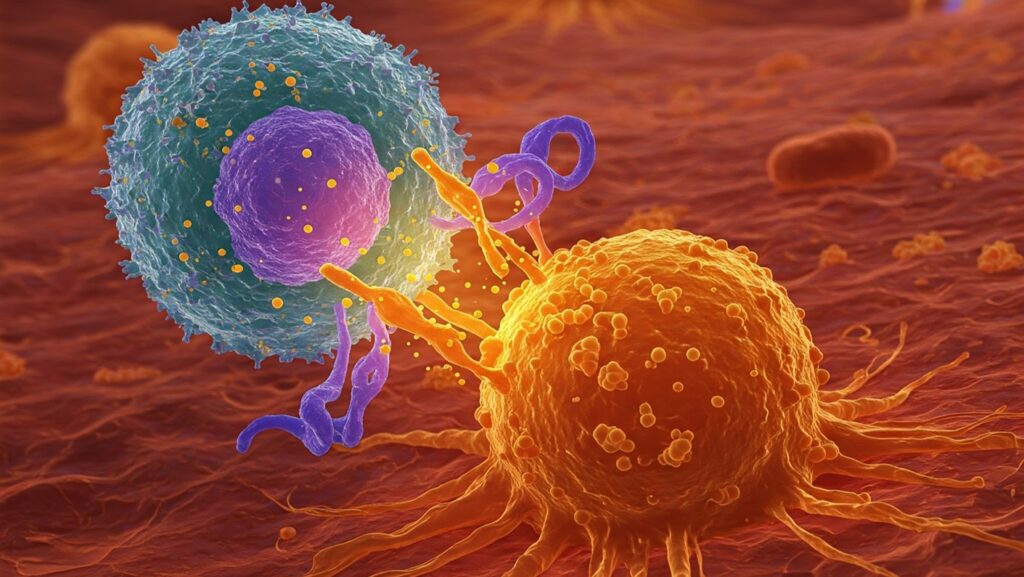The American Society of Clinical Oncology (ASCO) 2025 annual meeting, held from May 30 to June 3, 2025, featured significant clinical developments across multiple cancer treatment modalities, with particular attention to antibody-drug conjugates (ADCs), CAR-T cell therapies, and immuno-oncology agents. The conference highlighted both promising advances and notable setbacks in cancer therapeutics, with several companies presenting pivotal trial data that will influence future treatment paradigms and regulatory pathways. Here is a summary of highlighted news

Lung Cancer
- Osimertinib (Tagrisso): The NeoADAURA trial highlighted that neoadjuvant osimertinib, given with or without chemotherapy, improved major pathological response rates in resectable EGFR-mutated NSCLC compared to chemotherapy alone. The combination with chemotherapy yielded a 26% major pathologic response (MPR) rate, and osimertinib monotherapy a 25% MPR rate, both significantly better than the 2% with placebo and chemotherapy. Interim event-free survival (EFS) also favored osimertinib regimens.
- Patritumab Deruxtecan (HER3-DXd): Merck & Co. and Daiichi Sankyo announced the voluntary withdrawal of their biologics license application (BLA) for patritumab deruxtecan. This decision followed disappointing overall survival data from the confirmatory HERTHENA-Lung02 Phase III trial in locally advanced or metastatic EGFR-mutated NSCLC, despite earlier positive PFS results. Attention has now shifted to ifinatamab deruxtecan (B7H3-DXd), another ADC from the same collaboration. Ifinatamab deruxtecan has shown encouraging response rates in the Phase II IDeate-Lung01 trial for relapsed extensive-stage small cell lung cancer (SCLC) and is being evaluated in the Phase III IDeate-Lung02 study as monotherapy versus chemotherapy. Merck and Daiichi also plan to study this ADC in combination with MK-6070, a DLL3-targeting T-cell engager, reflecting a growing trend toward combination regimens.
- Telisotuzumab Vedotin-Tllv (Emrelis): The FDA granted accelerated approval on May 14, 2025, for Emrelis in adults with locally advanced or metastatic, non-squamous NSCLC exhibiting high c-Met protein overexpression.
- Rilvegostomig: Early results from cohort 5 of the TROPION-Lung04 trial showed encouraging results, a 57.5% ORR with datopotamab deruxtecan (Datroway) plus AstraZeneca’s PD-1/TIGIT bispecific rilvegostomig as first-line treatment in advanced/metastatic NSCLC, including 1 complete response and 22 partial responses among 40 patients.

Breast Cancer
- Trastuzumab Deruxtecan (Enhertu): Data from the Phase III DESTINY-Breast09 trial in first-line HER2-positive breast cancer was a key presentation. Positive results were also noted from DESTINY-Breast11 in the adjuvant setting and DESTINY-Gastric04 in gastric/gastroesophageal junction cancer.
- Sacituzumab Govitecan (Trodelvy): Primary results from the ASCENT-04 (KEYNOTE-D19) study in PD-L1-positive advanced/metastatic triple-negative breast cancer (TNBC) were presented, demonstrating superior PFS. The ASCENT-03 trial in metastatic TNBC also met its PFS endpoint.
- Outlook: These ADCs continue to show significant promise across various breast cancer subtypes, potentially leading to further practice-changing guidelines.
Detailed data reported by Daiichi can be found HERE

Colorectal Cancer
- Atezolizumab + mFOLFOX6: The pivotal Phase III ATOMIC trial demonstrated that adding atezolizumab to standard mFOLFOX6 chemotherapy significantly improved disease-free survival (DFS) in patients with resected stage III dMMR (deficient mismatch repair) colon cancer. The three-year DFS rates were 86.4% in the atezolizumab combination arm versus 76.6% with mFOLFOX6 alone, indicating a 50% reduction in the risk of recurrence or death.
- Outlook: These compelling data strongly support the adoption of atezolizumab plus mFOLFOX6 as a new standard of care for this patient population, representing a major advancement in adjuvant therapy.
- IBI363: This treatment showed promising clinical activity as monotherapy and in combination with bevacizumab in advanced MSS/pMMR colorectal cancer.

Multiple Myeloma
- Fixed-Duration Treatment: A notable trend at ASCO 2025 was the emerging potential of fixed-duration therapies for multiple myeloma, particularly those based on sustained minimal residual disease (MRD) negativity.
- New Standard of Care: The combination of daratumumab (Darzalex) with bortezomib (Velcade), lenalidomide (Revlimid), and dexamethasone (DVRd or DKRd) is establishing itself as a new standard of care for newly diagnosed patients. The ADVANCE trial demonstrated that 59% of DKRd-treated patients achieved MRD-negativity after eight cycles, compared to 36% with the KRd regimen. At a median follow-up of 32.7 months, the DKRd arm showed an 86% progression-free survival (PFS) rate, versus 79% for KRd, without significant added toxicities.
- Belantamab Mafodotin (Blenrep): Positive data from the Phase III DREAMM-7 and DREAMM-8 trials for this GSK-developed treatment were reported.
- Outlook: The positive outcomes from the ADVANCE trial underscore the potential for this quadruplet regimen to significantly improve patient outcomes and become the preferred initial treatment approach. Bispecific antibodies like talquetamab-tgvs and teclistamab-cqyv are also becoming key options for heavily pretreated patients.
Melanoma (Skin Cancer)
- Pembrolizumab (Keytruda): New findings suggested that the timing, combination, and duration of immunotherapy could significantly impact patient outcomes in skin cancer. Data showed that administering Keytruda before and after surgery for stage II melanoma was safe and feasible, resulting in an 84% two-year recurrence-free survival rate.
- Triple Therapy for Brain Metastases: A combination of encorafenib (Braftovi), binimetinib (Mektovi), and Opdivo showed promising results for melanoma that has spread to the brain, achieving a 50% six-month PFS rate compared to 29% with standard immunotherapy (ipilimumab and nivolumab). While associated with high rates of serious side effects, the study met its primary endpoint.
- Cemiplimab (Libtayo): This treatment demonstrated significant benefit when given to patients with localized squamous cell carcinoma after surgery and radiation, reducing the risk of recurrence or death by 68% over 24 months, with an 87.1% disease-free survival rate.
- Duration of Anti-PD-1 Therapy: New evidence from the DANTE trial suggested that stopping anti-PD-1 immunotherapy after one year was non-inferior to continuing treatment for at least two years in patients with metastatic melanoma. However, the study was underpowered and closed early, so continuing anti-PD-1 therapy for at least two years remains the standard of care for first-line advanced melanoma treatment.

Gastric/Gastroesophageal Junction Cancer
- Durvalumab (Imfinzi) + Chemotherapy: When administered with chemotherapy before and after surgery for early-stage stomach cancer, this combination reduced the risk of cancer recurrence or progression by 29%, achieving a 67.4% event-free survival rate compared to 58.5% in the placebo-chemotherapy cohort.
- Outlook: This trial establishes a new treatment paradigm for early-stage and locally advanced gastric and gastroesophageal junction cancers, highlighting the benefits of earlier immunotherapy integration.
Prostate Cancer
- Niraparib (Zejula) + Abiraterone Acetate plus Prednisone (AAP): The Phase III AMPLITUDE study in metastatic castration-sensitive prostate cancer (mCSPC) with homologous recombination repair (HRR) gene alterations showed that this combination significantly reduced the risk of radiographic progression or death by 48% in the BRCA-mutated group and 37% in the broader HRRm population. While overall survival data are still maturing, the study met its primary endpoint for PFS.
- Outlook: This combination shows significant efficacy for mCSPC patients with HRR alterations, particularly those with BRCA mutations, and is expected to influence treatment guidelines.
- Darolutamide: This treatment received FDA approval for metastatic castration-sensitive prostate cancer and demonstrated positive overall survival when used in a triplet regimen.
Ovarian Cancer
- Relacorilant + nab-paclitaxel: The Phase III ROSELLA trial reached its primary endpoint of improved PFS in platinum-resistant ovarian cancer, showing a median PFS of 6.5 months compared to 5.5 months with nab-paclitaxel alone.
- Avutometinib + Defactinib (Avmapki Fakzynja Co-pack): The FDA granted accelerated approval on May 8, 2025, for this combination in adults with KRAS-mutated recurrent low-grade serous ovarian cancer who have received prior systemic therapy.
Myelofibrosis
- Pacritinib (Vonjo) and Momelotinib (Ojjaara): While ruxolitinib (Jakafi) remains a cornerstone, these newer JAK inhibitors offer effective alternatives, especially for patients experiencing anemia or thrombocytopenia, with a more favorable myelosuppression profile. The MOMENTUM trial showed momelotinib significantly reduced total symptom scores and improved spleen volume response.
- Outlook: These advancements contribute to a broader movement toward more personalized and tolerable treatment strategies for myelofibrosis.
Glioblastoma (Brain Cancer)
- Dual-target CAR T-cell therapy: Early data from a Phase I trial showed promise in slowing tumor growth in recurrent glioblastoma, with nearly two-thirds of patients experiencing tumor shrinkage. Several patients demonstrated notable survival beyond 12 months, exceeding typical expectations for this aggressive cancer.
- Outlook: With safety established, further clinical trials are planned for newly diagnosed GBM patients, offering hope for improved outcomes in this challenging disease.
Squamous Cell Carcinoma of the Anal Canal (SCAC)
- Retifanlimab-dlwr (Zynyz): The FDA approved Zynyz on May 15, 2025, for first-line treatment of inoperable locally recurrent or metastatic SCAC when combined with carboplatin and paclitaxel. It also received approval as a single agent for patients with disease progression or intolerance to platinum-based chemotherapy.
Neuroendocrine Tumors
- Cabozantinib (Cabometyx): The FDA approved Cabometyx on April 25, 2025, for adult and pediatric patients aged 12 and older with previously treated, unresectable, locally advanced, or metastatic well-differentiated pancreatic neuroendocrine tumors.
Urothelial Carcinoma
- Enfortumab Vedotin (EV) + Pembrolizumab: The results of the EV-302 trial led to the approval of this combination as a first-line therapy for locally advanced or metastatic urothelial carcinoma.
General Trends and Other News
- Antibody-Drug Conjugates (ADCs) and Immunotherapies were prominent topics at ASCO 2025, with over half the sessions focusing on these modalities. This highlights a strategic shift towards integrating these therapies earlier in cancer treatment, including before and after surgery.
- Fertility Preservation in cancer patients received updated clinical practice guidelines from ASCO, now recommending its inclusion in survivorship care and endorsing in vitro maturation (IVM) of eggs as an emerging method.
- Oncology Pathway Tools were found to be consistently used across diverse patient groups, indicating their effectiveness in promoting equitable, evidence-based cancer care.
- Belrestotug: A notable setback was the termination of the development program for belrestotug, an anti-TIGIT antibody, due to its failure in a Phase II trial for NSCLC.
Overall, ASCO 2025 underscored the ongoing paradigm shift in cancer treatment, with continued advancements in targeted therapies, immunotherapies, and ADCs leading to improved outcomes for various cancer types, and a growing focus on personalized and earlier treatment strategies.


